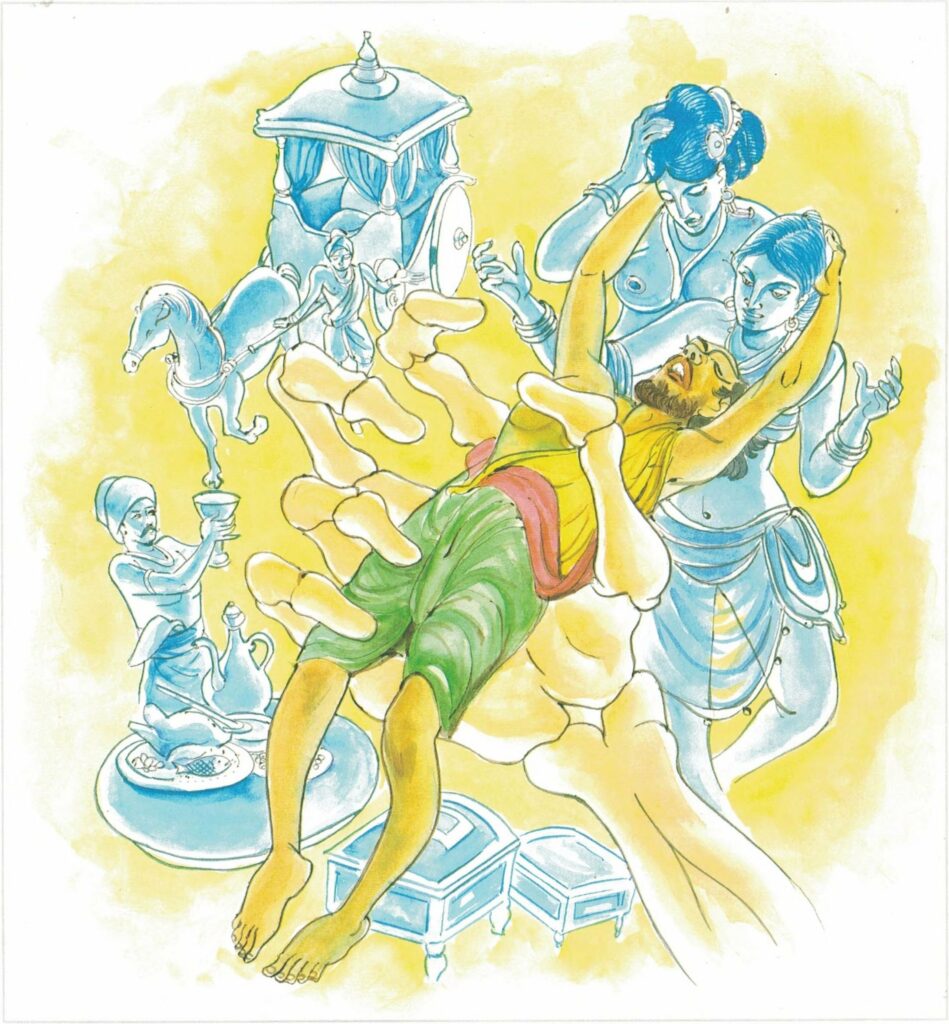Pali text, illustration and English translation of Dhammapada verse 48:
pupphāni heva pacinantaṃ byāsattamanasaṃ naraṃ |
atittaṃ yeva kāmesu antako kurute vasaṃ || 48 ||
48. For one of desires insatiate who gathers only pleasure-flowers, for one who has a clinging mind Death the sovereign overpowers.

The Story of Patipūjikā Kumāri
While residing at the Jetavana Monastery, the Buddha spoke this verse, with reference to Patipūjikā Kumāri.
Patipūjikā Kumāri was a lady from Sāvatthi. She married at the age of sixteen and had four sons. She was a virtuous as well as a generous lady, who loved to make offerings of food and other requisites to the monks. She would often go to the monastery and clean up the premises, fill the pots and jars with water and perform other services. Patipūjikā also possessed Jātissara Knowledge (remembrance of past births) through which she remembered that in her previous existence she was one of the numerous wives of Mālābhārī, in the deva world of Tāvatiṃsa. She also remembered that she had passed away from there when all of them were out in the garden enjoying themselves, picking flowers. So, every time she made offerings to the monks or performed any other meritorious act, she would pray that she might be reborn in the Tāvatiṃsa realm as a wife of Mālābhārī, her previous husband.
One day, Patipūjikā fell ill and passed away that same evening. As she had so ardently wished, she was reborn in Tāvatimsa deva world as a wife of Mālābhārī. As one hundred years in the human world is equivalent to just one day in Tāvatiṃsa world, Mālābhārī and his other wives were still in the garden enjoying themselves and Patipūjikā was barely missed by them. So, when she rejoined them, Mālābhārī asked her where she had been the whole morning. She then told him about her passing away from Tāvatiṃsa, her rebirth in the human world, her marriage to a man and also about how she had given birth to four sons, her passing away from there and finally her return to Tāvatiṃsa.
When the monks learned about the death of Patipūjikā, they were stricken with grief. They went to the Buddha and reported that Patipūjikā, who was offering alms-food to them early in the morning, had passed away in the evening. To them the Buddha replied that the life of beings was very brief; and that before they have satisfied their desires for sensual pleasures, they were overpowered by death.
Explanatory Translation (Verse 48)
iha pupphāni pacinantaṃ iva byāsatta manasaṃ
naraṃ kāmesu atittaṃ eva antako vasaṃ kurute
iha: here; pupphāni: flowers (in a garden); pacinantaṃ iva: like one who plucks; byāsatta manasaṃ [manasa]: mind glued to the pleasures of the senses; naraṃ [nara]: man; kāmesu: in the sensual pleasures; atittaṃ eva: while one is still insatiate; antako [antaka]: Death (Ender); vasaṃ kurute: brings under his spell
Those who pursue worldly pleasures are like garland-makers who pick flowers here and there in the garden according to their preference. Those given to pleasures of the senses are not satisfied. They seek still more. In consequence of their endless pleasure-seeking they come under the spell of Antaka, or ‘ender of all’, i.e. death.
Commentary and exegetical material (Verse 48)
antako: literally the end-maker. This is another epithet for Māra–death. In this stanza, the end-maker is said to bring under his spell those who are glued to sensual pleasures to the exclusion of all else. kāma: may denote: 1) subjective sensuality, sense-desire; 2) objective sensuality; the five sense-objects.
Subjective sensuality or sense-desire is directed to all five sense-objects, and is synonymous with ‘sensuous desire’, one of the five hindrances; ‘sensuous lust’, one of the ten Fetters; ‘sensuous craving’, one of the three cravings;‘sensuous thought’, one of the three wrong thoughts. Sense-desire is also one of the cankers and clingings.
“There are five cords of sensuality; the visible objects, cognizable by eye-consciousness, that are desirable, cherished, pleasant, lovely, sensuous and alluring; the sounds… smells… tastes… bodily impressions cognizable by body-consciousness, that are desirable…”
These two kinds of kāma are also called: kāma as a mental defilement, as the object-base of sensuality. Sense-desire is finally eliminated at the stage of the non-returner. The peril and misery of sense-desire are often described in the texts which often stress the fact that what fetters man to the world of the senses are not the sense-organs nor the senseobjects but desire.